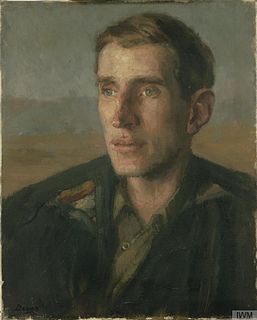A Quote by Havelock Ellis
In philosophy, it is not the attainment of the goal that matters, it is the things that are met with by the way
Quote Topics
Related Quotes
For me, exploration was a personal venture. I did not go to the Arabian desert to collect plants nor to make a map; such things were incidental. At heart I knew that to write or even to talk of my travels was to tarnish the achievement. I went there to find peace in the hardship of desert travel and the company of desert peoples. I set myself a goal on these journeys, and, although the goal itself was unimportant, its attainment had to be worth every effort and sacrifice... No, it is not the goal but the way there that matters, and the harder the way the more worth while the journey.
It's as if scientists exert every effort of will they possess deliberately to find the least significant problems in the world and explain them. Art matters. Happiness matters. Love matters. Good matters. Evil matters. Slam the fridge door. They are the only things that matter and they are of course precisely the things that science goes out of its way to ignore.
Religion means goal and way, politics implies end and means. The political end is recognizable by the fact that it may be attained--in success--and its attainment is historically recorded. The religious goal remains, even in man's highest experiences, that which simply provides direction on the mortal way; it never enters into historical consummation.
It is true that some secluded intellectuals in their esoteric circles talk differently. They proclaim the priority of what they call eternal absolute values and feign in their declamations—not in their personal conduct—a disdain of things secular and transitory. But the public ignores such utterances. The main goal of present-day political action is to secure for the respective pressure group memberships the highest material well-being. The only way for a leader to succeed is to instill in people the conviction that his program best serves the attainment of this goal.
There is a truth in Schopenhauer’s view that philosophy is an organism, and that a book on philosophy, with a beginning and end, is a sort of contradiction. ... In philosophy matters are not simple enough for us to say ‘Let’s get a rough idea’, for we do not know the country except by knowing the connections between the roads.
All the old traditions tell us that there is more than one path to the great Goal.. . . The shortest and easiest pathway of all is the pathway of Love. It is the one pathway that is open to all, irrespective of what their personal conditions or circumstances may be. For every person, everywhere, true attainment awaits through the yoga of Love, for yoga means union and it is our union with God that makes the attainment possible.
Philosophy - reduced, as we have seen, to philosophical discourse - develops from this point on in a different atmosphere and environment from that of ancient philosophy. In modern university philosophy, philosophy is obviously no longer a way of life, or a form of life - unless it be the form of life of a professor of philosophy.
Philosophy is not a body of knowledge to impart to someone, that's why reading philosophy books isn't always the best way of learning philosophy. Philosophy is really more the process of rational engagement, rational reflection with a diversity of views and ideas and opinions and trying to sort of reason your way through to a more reflective position. I think if you look at it that way, philosophizing is to some extent some small way a part of almost everyone's lives although they don't recognize it as such and a lot of people are embarrassed about it.
One of the things I want to do in the book is to explore how philosophy can be done in literature. I start doing that in the first chapter, by introducing the idea of "philosophy by showing". What literature/philosophy shows is how to look at some important facets of life in a new way, thus changing the frame in which subsequent philosophical argument proceeds.





































